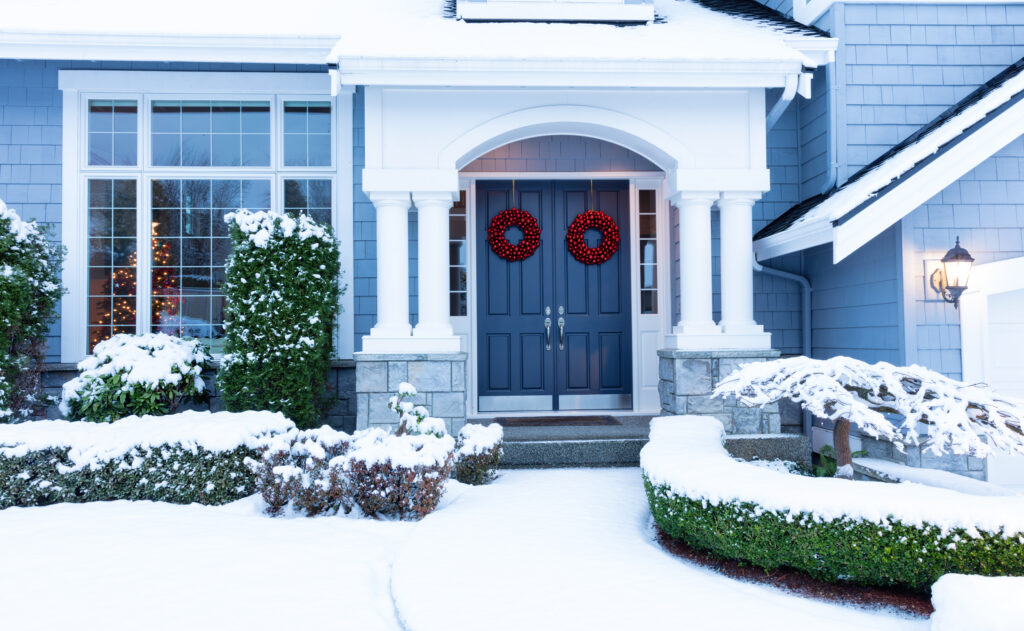9 Steps To Prepare Your Home For Winter
As winter approaches, it’s time to prepare your home to avoid damages that the change in weather conditions can cause. With falling snow and cold temperatures, you’ll want to cozy up with warm coffee, a fur blanket, and knowing that you’re safe.
To make sure that you get through the cold seasons, here are some tips to help you prepare your home for winter.

Image source here
1. Inspect Your Home’s Heating And Air Conditioning System
Most heating and air conditioning systems last for 12 to 15 years. However, other systems barely last for ten years, while others may still be strong for 20 years. Whether an AC system lasts longer or not all depends on how it’s maintained.
Before the beginning of cold weather, it’s time to change your filters. Ensure that your heating and air conditioner system is checked and is functioning at its best.
You may need to contact professional heating, ventilation, and air conditioning contractor from a reputable heating company such as Air Makers to inspect your system to ensure the heating system will work when the time comes. It’s always right to find an HVAC issue in moderate fall temperatures than to discover the problem on a freezing winter day.
2. Insulate The Pipes
Ensure that all exposed pipes running along the walls or around unheated areas such as the basement are insulated. The water inside such pipes can freeze, causing the pipes to burst when the temperatures drop. You can easily protect these pipes by insulating them or getting a contractor to do the job.
3. Check Your Drainage
Ensure that the soil around the foundation of your house hasn’t settled to avoid water stagnating around it. If there are any low stops, try filling them with some soil—then, go around and inspect the rain gutters downpipes.
Confirm that water is moving efficiently away from your home and add some downspout if necessary. Saturated soil around your home’s foundation can be a potential hazard since it freezes and thaws throughout winter.
4. Inspect Tree Branches
Check out whether there are growing branches over your house, garage, driveways, or power lines. In the event of a storm, these branches may come down, causing major damage to your property. If there’s a tree nearby your home that you suspect can be dangerous, call an arborist to evaluate it or remove it.
5. Clean The Gutters
Clogged gutters can pose a hazard since the debris can freeze into a huge icy mass that later damages the roof. With a tall ladder and gloves, you can successfully scoop out the debris for easy water drainage.
6. Clean Your Chimney And Order Firewood
Ensure that your fireplace is clean and working since you’ll need it more during winter. Have a chimney sweep company identify if your fireplace is safe to use and determine whether it requires maintenance.
You should also make sure that you have enough firewood for the season. Stack and cover the firewood in a good location and ensure that there isn’t rotten firewood and, if there’s any, separate them from the others.
7. Seal Your Masonry And Hard Surfaces
When repairing your home for winter, don’t forget your patio. If your patio, walkways, or driveways are made of concrete, ensure they’re well protected.
Cover your flat exterior concrete surfaces with a concrete sealer from time to time. Flat concrete surfaces eventually develop cracks, but they can be limited by placing control joints on the concrete.
Check your concrete and fill all cracks before applying a concrete sealer to avoid water from getting in and freezing during winter. This will ensure that your concrete work lasts long.
8. Prevent Your Door Locks From Freezing
Of course, no one would want their door locks to freeze during winter. If they do, it gets difficult to open the doors. To prevent the door locks from freezing, spray a little-powdered-graphite lubricant into the lock and turn the key. The powder helps lubricate the pins in the lock, preventing them from sticking. You can repeat this once a season.
9. Check Your Insurance Coverage
Before winter begins, it’s the right moment to talk to your home insurance company to review your coverage. If you’ve done renovations that can add some value to your home, ensure the insurance coverage covers them. You may also want to know how your policy covers damages that may occur during winter.
Conclusion
Most people may overlook the importance of preparing their homes for winter. However, early preparations ensure that your home is ready and in good shape for winter. If you live in an area that experiences harsh winters, prepare ahead of time so that when winter strikes, you’ll rest easy.